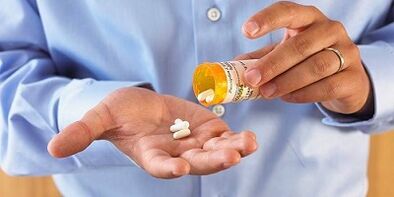If the prostatitis appears, there is a need for special treatment.Natural disease develops in a third of patients.Bacterial growth should be prevented by using appropriate drugs.Antibiotics for priest inflammation are prescribed when the diagnosis is confirmed by preliminary examination.For treatment, it brings the desired effect, acting on the body as carefully as possible, choosing the drugs will help you best, learn how to use them and potential threats to use.
Advantages of antibiotic treatment
Modern medicine uses antibiotics for prostatitis or other diseases thanks to their ability:
- quickly destroy the origin of the disease and eliminate inflammation;
- developing substances that kill or prevent the spread of large bacteria and viruses, but are safe for macro cells;
- External actions (candles, ointments) and in other management methods: intramuscularly, oral, intravenously;
- Fighting simultaneously with many pathogens of the disease (broad -spectrum antibiotics).
The main antibacterial drug groups are used for prostatitis
Antibiotics are a relatively new substance opened in the 20s of the last century.A large list of viral neutralizing drugs, eliminating the cause of prostatitis and other diseases.Another nature of the effect, the difference in the chemical structure allows to distinguish some antibiotic groups from prostatitis with bacterial properties: chronic or acute.
Fluoroquinolones
Today, fluoroquinolones are chemically synthesized.Activities that affect bacteria of different types are well treated by chronic form of the disease.Fluorineolon is absorbed into the digestive tract as quickly as possible.From here, they easily move inside the cells of organs and tissue, destroying bacteria.The drug causes the gastrointestinal tract and the nervous system, allergies.In rare cases, kidney diseases, musculoskeletal systems, hearts, candidiasis, colitis are observed.
Tetracyclines
The Tetracyclines family includes a range of antibiotics that act close to the composition and properties.They have the same mechanism that affects bacteria, close characteristics and completely diagonal ability.If a drug is no longer active on the body, they will not be effective.To achieve results, it is better to use other medications.Tetracycline is highly active with bacteria that cause prostatitis, but it is difficult to transfer.
Penicillins
Penicillins prevents the synthesis of peptidoglycan, from which the cells of bacteria are built.From there they died.The body of mammals does not produce peptidoglican, so these drugs are safe for one person, the only thing that can be encountered, using them - allergies.The most commonly used drugs for the prostatitis of the penicillin group are tablets.
Cephalosporin
The bactericidal principle of the effect of cephalosporin is dangerous for microorganisms.It damages their cell walls and leads to death.The assimilation of the groups of this group from the digestive tract is weak.They irritate the mucous membranes, allergies, renal disorders, contraindicated in the risk of meningitis.Use intramuscularly.
Macrolides
Macrolide is the least unique antibiotic of natural origin, preventing bacterial reproduction.These drugs are rarely used, because the effect is not proven.Patients withstand therapy with these agents with good prostatitis.Preparations rarely contribute to the appearance of allergies, no cases of inhibition of liver or kidneys, destroying joints, bone tissue, toxic effects.
Antibiotic management program to treat prostatitis in men
To cure the disease effectively, it is necessary to diagnose, this will show the type of psychic substance of the disease in a specific patient, their sensitivity to the drug.Based on the results of the tests, the doctor decides what is the treatment of chronic prostatitis or acute form of the disease.The collection of procedures will help reduce prostatitis if the disease occurs bacteria.
Prostatitis treatment regimen includes:
- Take antibiotics to remove bacteria;
- The use of drugs to improve blood circulation, reduce obstruction;
- Add anti -inflammatory - if you need to ease the pain by reducing the edema of the gland;
- immune system adjustments;
- Vitamin A, B6, E, C;
- Microelements: Selenium, zinc, magnesium;
- sedative;
- Herbs (Lingonberry, Eldberry, St. John's Wort, Trench and Goldener);
- Prostate massage - it reduces inflammation, eliminates stagnant secret;
- Exercise - stimulate blood circulation.
With an acute pathology
Treatment is performed in a hospital or under home medical control.Use comprehensive effects: cephalosporin, tetracycline and with reduced inflammation - fluoroquinolones.For quick efficiency, the urinary doctor can prescribe the use of two antibiotics.
The results of acute inflammatory therapy, as prescribed, can be seen immediately, but absolutely cannot stop taking the drug.Bring a 4 -week course to the end and observe the correct dosage to prevent inflammation.If not, it can turn into a chronic form.If you clearly complete all the recommendations of the urinary doctor, the disease will withdraw forever and will no longer return.
In chronic prostatitis

A slow chronic process of prostate disease is much more observed.The calm stages are replaced by serious.Chronic prostatitis is treated?The forecast is less comfortable in the case of acute inflammation.Weaker therapeutic results: The pathology changes the structure of the gland tissue so that antibiotics do not linger in them for a long time.Appointments:
- The preparations are prescribed, with the nature and sensitivity of the microbiological system.
- The highly effective drug of a broad spectrum, especially Cephalosparin and Macrolides, Fluoroquinolones.
- The minimum course is a month, however, some interrupted cycles are usually done.Unable to treat when improving the condition: changes may be fooled.
Which antibiotic is the most effective
To treat or reduce the manifestations of the infectious prostatitis, strictly comply with the doctor's recommendations.Start the course only after the diagnosis, when the doctor finds the nature of the disease.The independent treatment of the house is full of vandalism and problems in the work of the body systems.
There are any side effects and contraindications
Typically, along with drugs, preparations restoring the prescribed microorganisms.Note that the reactions may be like this for antibiotics:
- Gastrointestinal malfunction;
- Allergic rash;
- Poisoning (fever, pain, diarrhea);
- The decline of good.
Antibiotics are not used to treat non -infections (stagnant).It is banned from taking them:
- with allergies;
- Kidney, liver disorders;
- pregnant;
- breastfeeding;
- Children.



























